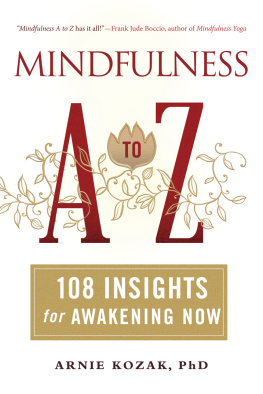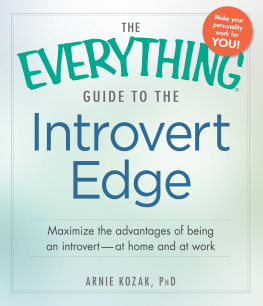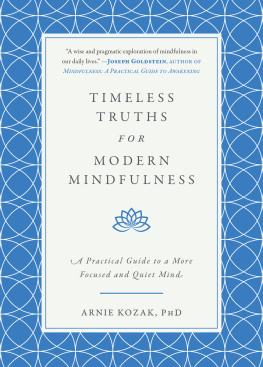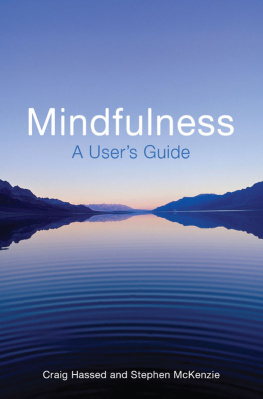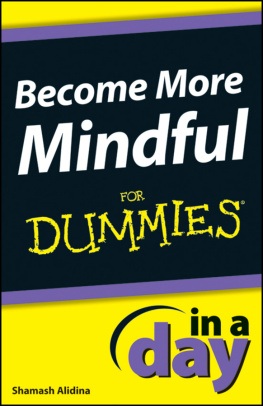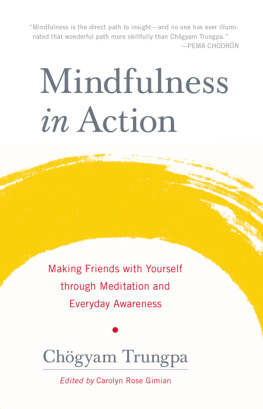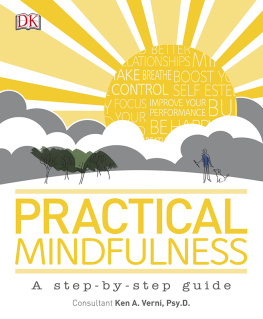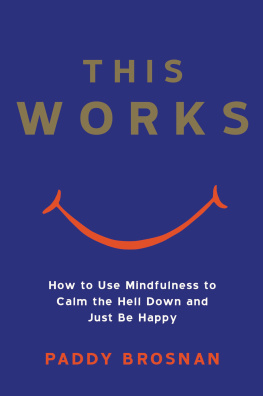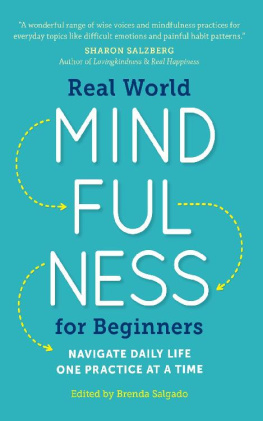Through personal revelation, Buddhist teachings, western science, and his own deep wisdom, Arnie offers us a banquet to savor!
Tara Brach, PhD, author of True Refuge
A SWEEPING FIELD GUIDE TO THE PRACTICE OF MINDFULNESS.
From Acceptance to Zafu, Mindfulness A to Z offers a wealth of inspirational advice and practical instruction on how to bring mindfulness fully into your life. In each entry, Dr. Kozak combines his personal insights and expert guidance on all aspects of mindfulness meditation. Mindfulness A to Z presents a multifaceted look at living mindfully in our hectic world, whether dealing with internal conflict, such as fear of missing out; technical problems, such as how to meditate comfortably; or everyday joys, such as finding your smile.
Mindfulness A to Z is a marvelous book: light in tone but deep in meaning. Thoroughly human yet transcendent.
Deborah Schoeberlein David, author of Mindful Teaching and Teaching Mindfulness
ARNIE KOZAK, PhD, is a clinical assistant professor of psychiatry at the University of Vermont College of Medicine, psychotherapist, and workshop facilitator. He is the author of several books including Wild Chickens and Petty Tyrants: 108 Metaphors for Mindfulness.


Table of Contents
Mindfulness is about paying attention to our life as it unfolds, moment-by-moment. To be mindful is to bring a particular kind of attention to our experienceone that is keen and focused on what is actually happening, as opposed to what we wish would happen. Mindfulness privileges perception over imagination. At its deepest levels, developing mindfulness helps us to clearly see that we construct much of our experience of the world and ourselves. And by construct I mean the quality of our minds determines the quality of our experiences. We are put together by our beliefs, stories, and attitudes. By practicing mindfulness we can learn to relate to the world, others, and ourselves in a more open and accepting way, without so many preconditions for happiness. A serious commitment to mindfulness, practiced over time, can help to move us toward a more awakened way of being-in-the-world.
Mindfulness has been the central theme of my adult life; I make maintaining a mindful demeanor a daily aspiration. Though many days I fall short of my goal, the wonderful thing about life is that it offers us another chance to be mindful in the very next moment. Even lapses in mindfulness provide useful opportunities to develop our skill! The cultivation of mindfulness in the service of awakening is a lifelong endeavor.
This book is a field manual for awakening mindfulness within yourself. It is composed of 108 brief chapters that contain seeds of practical wisdom that you can cultivate in your life. The bits of wisdom collected in these pages are drawn from my decades of practicing mindfulness and are informed by my experience teaching mindfulness to clinical patients, members of the community, fellow health care practitioners, university students, and Buddhist seekers. Many of the entries contain personal stories; some of the entries are based on metaphors, a common literary form that the Buddha used in his teaching, and one that I explored more deeply in my book Wild Chickens and Petty Tyrants: 108 Metaphors for Mindfulness.
The alphabetized reflections contained herein are intended to inspire the integration of mindfulness into the fabric of daily life, and to encourage regular practice of mindfulness meditation. They can be read straight through or at random. I suggest you read the first entry on acceptance and then move where you likeon to the next or to whatever topic captures your interest. Read and reflect on one per day, and in a few months you may notice yourself living more intentionally, deliberately, and with greater ease. Each entry is an invitation to entertain, embrace, and embody a facet of mindfulness. Some entries contemplate Buddhist teachings that extend considerably beyond the practice of mindfulness as a means of managing stress, to the possibility of awakening itself.
Claiming the here and now is preferable to spiraling down into reactivitybeing upset at being upset and missing out on the opportunity of this moment. Im no stranger to that spiral. Im right there with the rest of humanity, trying to live a happier, more meaningful lifetrying to find a way beyond mere reactivity as some of my stories will reveal. Remembering to be mindful in every moment can be difficult to do. Yet the ideas in this book are not difficult to understand. They are straightforward and available to anyone at any time. Since you are reading this, I am pleased to know that this may be your time.
Arnie Kozak
Mindfulness A to Z
A is for acceptance.
I sat my first vipassana retreat in 1989. The first meditation retreat can be brutal on the body. I had my share of stiffness and soreness, especially in my knees. About seven days into the process I couldnt get comfortable no matter what position I struck. There was no escape from the pain unless I was willing to abandon the retreata thought I relished for a long while. So there I was, sitting with the agony, hour after hour, fighting against it, wishing it wasnt there. During one of the hour-long sittings I realized I had a choice: I could continue resisting the pain or I could try to accept it.
I chose acceptance. I turned my attention toward the sensations instead of away, which is where I instinctively wanted to go. After a week of practice, I had developed a level of concentration that allowed me to look precisely at my own bodily discomfort. My first approximation of that discomfort was that it was solid, intractable, difficultlike a railroad spike had been pounded into my knee. As I got closer to it with concentration, I noticed something else: oscillation, variation, and cessation. Within the discomfort there were moments of peace surrounded by moments of intensity. There was no pain, only energy. The story of how awful it was dropped away, leaving only the bare experience of it. After that sitting, the tension in my muscles released; my body relaxed into the moment, and the rest of the retreat was free from that particular suffering.
When we are mindful, when we give our full attention to whatever is happening now, and can do so without the usual storytelling, pushing, pulling, and judgment, we arrive at acceptance. But it is rare that we give our full attention to what is happening now. We give partial attention; the rest of our attention is somewhere else. We are easily distracted. Our attention is always alighting some place other than here; we may think about whats for dinner, or review a past conversation. Wherever our attention is, it is not here, fully experiencing this present moment.
Thus, every moment of our existence presents us with the same basic choice that confronted me on the retreat. We can be present to what is happening, or we can fight against it. The tendency to resist is automatic, reflexive, and perhaps even compulsive. It may be relentless. Like a comfort-seeking missile, we may tweak, adjust, and modify every circumstance. Or, in the rare moments when things feel perfect, we may worry about losing the experience, and in these moments we are resisting the inevitable changing nature of things.
Acceptance is not acquiescence. We find ourselves in many situations that are not ideal. In some such situations reasonable action can be taken to change things. However, there are many situations in life where a simple act to change things is neither feasible nor possible. In such situations, acts of resistance become fruitless, and acceptance becomes a more meaningful option. When we resist, we are, in a sense, complaining about the situation. The complaint creates a boundary between oneself and the experience one is having at that moment. It takes energy to maintain that boundary. Our sense of me pushes against the reality of the situation and cries: I dont want this.
Next page
